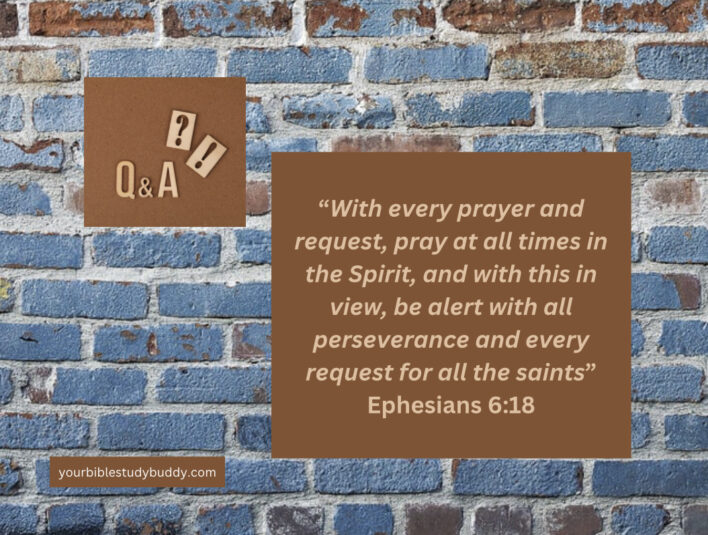Have you ever read a passage of Scripture, knowing what it says, but wondering what it looks like in practice? That’s exactly what happened to me when I read Ephesians 6:18. Let’s study through this, phrase by phrase, and get some answers to our questions.
“With every prayer and request,
pray at all times in the Spirit,
and with this in view,
be alert with all perseverance
and every request for all the saints”
QUESTION 1: What is the different between a “prayer” and a “request”?
Prayer <proseuche> means prayer addressed to God for aid. Prayer is asking God, in word or in thought, for aid (to provide with what is useful or necessary in achieving an end or to give assistance to).
Request <deesis> means supplication for others; petitioning for a need. The dictionary defines supplication as asking for something earnestly and humbly. I think the key word that sets “request” apart from “prayer” is the phrase for others.
QUESTION 2: What does “praying in the Spirit” look like with skin on?
I think the answer to this question is found in the little word “in“. The Greek word for “in” <en> denotes both a fixed position (we are are firmly fixed in Christ, never to lose our salvation) and instrumentality. The instrumentality part leads itself to a relation of rest. Because I am firmly fixed in Christ, the Spirit is the One who directs our prayer. To pray “in the Spirit” means to pray — by the power of and by the aid of the Spirit. Romans 8:26 tells us “In the same way, the Spirit helps us in our weakness. We do not know what we ought to pray…”.
Pray WHEN the Spirit leads, HOW the Spirit leads, AS OFTEN as the Spirit leads, and about WHAT the Spirit leads. The Spirit is the One who prompts us when to pray and what to pray for. There are times when someone will ask you to pray about something, but as you are praying, the Spirit prompts you to redirect your petition to include something else.
QUESTION 3: What does praying “at all times” look like with skin on?
At all times <kairos> in every season. The word “season” sends my mind going. haha. In the winter time, when circumstances around us look dull and lifeless, cold and unbearable — PRAY. In spring times, when it’s getting warmer and things are blossoming with new life and fresh possibilities — PRAY. In summer times, when circumstances may seem to be heating up to unbearable “temperatures” — PRAY. In fall times, when, although we know summer has come to an end, we are met with blazing colors for us to enjoy, all the while knowing that winter times will be coming — PRAY.
Another aspect of “at all times”, according to commentator David Guzik, can refer to different instances of prayer — group prayer, individual prayer, silent prayer, shouting prayer, walking prayer, kneeling prayer, eloquent prayer, groaning prayer, constant prayer, fervent prayer. And Matthew Henry commented that this could refer to the parts of prayer: confession of sin, petition for mercy, and thanksgivings for favors received.
QUESTION 4: What does it “be alert with all perseverance” mean?
The Bible defines “be alert“ <agrypneo> as, to be sleepless; to keep awake and watch; to be circumspect, attentive, ready — someone who is intent upon a thing. My attention landed on the three words — circumspect, attentive, and ready. Let’s look at those definitions.
Someone who is circumspect is careful to consider all circumstances and possible consequences; to be prudent. So the circumspect prayer would cover all the bases of the situation they are praying about — the physical realm, the emotional realm of the person, the spiritual part of the person, the relationships of the person.
The attentive person is mindful and observant, paying attention to the comfort of another. So the attentive prayer would pray about what is said and what is NOT said. They pay attention to others over self and are perceptive to their needs, those mentioned and those NOT mentioned.
A ready person is someone who is prepared mentally or physically for some experience or action. They are prepared for immediate use and willingly disposed to jump to action. A ready prayer doesn’t need someone to ask them to pray; they perceive and need and get at it.
With all perseverance <proskarteresis> describes persistency. I’m sitting here giggling as I recall a commercial I saw where an annoying little kid was at his mom’s bedside, poking her and saying, “mom, mommy, mama, ma…..”. That kid was annoyingly persistent. Sometimes God answers our prayer in a timely manner and other times, not so much. To be alert with all perseverance describes the person who prays “with their eyes open” to others’ situations, not giving up when the answer is delayed.
QUESTION 5: Does God really mean “for all the saints”?
Whether you look up all in our American dictionary or in the Greek lexicon, all means all. God is telling me to pray for all my siblings int he Lord, not just the ones I happen to like. Well now, just color me convicted!
Matthew Henry wrote, “And we must pray, not for ourselves only, but for all saints; for we are members one of another. Observe, None are so much saints, and in so good a condition in this world, but they need our prayers, and they ought to have them.”
What is coming to mind is 1 Corinthians 12:12-27, which says specifically that, “If one part suffers, all the parts suffer with it…You are the body of Christ and parts of each other.”
Now that a lot of questions now have answers, my prayer is that the truth in this verse would reshape our prayer life to the glory of God.

